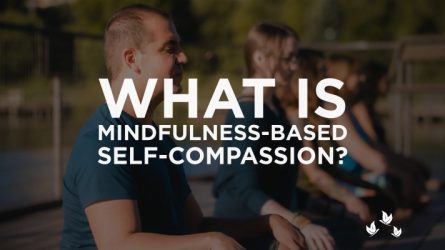As mindfulness becomes more mainstream, there is a concern that it becoming diluted and misinterpreted through promotional and marketing schemes. There are now blogs, books, and instructors promoting mindfulness for performance, mindfulness for employees, how to be happy with mindfulness, and so on. While these outcomes may occur, it is not a guarantee.
In his book, Full Catastrophe Living, John Kabat-Zinn defines mindfulness as “Mindfulness is awareness that arises through paying attention, on purpose, in the present moment, non-judgmentally. It’s about knowing what is on your mind.”
Imagine you have a though that is not pleasant– maybe a tumultuous relationship, stress from work, pain in the body, or exhaustion. Mindfulness is not about searching for answers, creating goals, or solving problems. It is simply becoming aware of what we are experiencing. While people may experience certain benefits from mindfulness, when we attach goals or desired outcomes with the practice it opens the door for judgment in our practice. For example, if we didn’t find happiness the first few times we practices now we can associate with mindfulness not working. After seeing a few headlines about mindfulness, here are a few myths we would like to debunk.
Myth #1: Mindfulness will make you happier
Nope. Sure it could be a benefit a lot of people. Studies have certainly demonstrated it is a possible outcome. However, there are flaws with this mindset. The first is that we are not always happy while practicing mindfulness. In fact, sometimes mindfulness can be extremely unpleasant such as the loss of a loved one. If we try to pretend our way into happiness and not feel what we are experiencing we are not working with our emotions. We are stuffing them down or hiding them. We lose the ability to work with what we are feeling and build resiliency.
We are also denying ourselves the ability to be compassionate with ourselves. We miss out on the chance to feel the emotions during difficult times in our lives. When we do not allow ourselves to be with difficult, we are not allowing ourselves the permission to be okay with not feeling okay. Sometimes life is hard and we have “negative” emotions but when we ignore them we deny ourselves the ability to nurture and take care of ourselves during a time when we may very well need to.
Mindfulness allows ourselves the opportunity to be compassionate with ourselves whether we are happy or not.
Myth #2: You can be good at mindfulness
Mindfulness is about non-judgment. There are some days that will be easier to practice. Other days we may feel like a dog in a park full of squirrels. There will be days we simply cannot be present. When we practice non-judgment, it affects our practice too. If we are having a hard time being present, we are simply having a hard time. When we can tune in to our thoughts with ease, that is the experience.
Rather than judging our experience as positive or negative just take the time to practice and train the mind. Regardless of the experience that is where the real work comes in.
Myth #3: Mindfulness is relaxing
Sometimes mindfulness is relaxing. However, life is not always happy or always pleasant. Often, mindfulness can force us to sit with the difficult. “The difficult” could be emotional pain such as grief or trauma. It can also be incredibly stressful periods of our lives related to work, financial, or family problems. Part of the reason why MBSR typically has an application process is that there are times mindfulness can be very challenging. It allows ourselves to tune into difficult emotions.
Relaxation techniques are a wonderful form of self-care but when mindfulness gets confused or marketed as being relaxing, it adds judgment and goals towards the practice. Rather than focusing on potential benefits, learning to practice with getting attached to an outcome helps cultivate a practice.
Myth #4: Mindfulness improves performance
Magazine titles that come to mind include: Mindfulness improves performance. Mindfulness makes better leaders. Mindfulness makes better mothers.
Mindfulness is not a goal setting technique. Mindfulness is a practice with no set time frame, outcome, or KPI. When we attach promises to mindfulness we are not practicing it. Instead of practicing being present, we are practicing striving. We are practicing being in the future and not experiencing what is in the hear and now.
While many people experience a positive impact of mindfulness, some people may not. That is okay. Either way, practitioners are still training their brain.
Myth #5: Mindfulness is easy
Everyone has the ability to be present, even if it is just for a second. However, it does not mean mindfulness is easy. Observing what is here, without judgment for long periods of time is challenging. Our brain naturally goes elsewhere. Many of us have subconsciously trained our brain to ruminate. In the advent of technology with notifications and pings popping up on our cell phones, we are in a constant battle to stay present.
Training and a regular mindfulness meditation practice can help rewire the brain to be more present. We can experience our lives more fully but it takes regular training. Much like training for a 5K or adjusting our diet, we need to practice. Every day may not be easy but it still helps train our mind.
Myth #6: Mindfulness is for everybody
Mindfulness is simple. It does not require special tools or expensive gear. However, mindfulness gives us the space to tune in to the difficult. Varying levels of trauma, current life circumstances, or personal support can trigger responses people may not always even be aware is going on.
Selecting training and courses with a qualified instructor or guide who maintains their own practice can help practitioners navigate what sort of support they need or to what degree of practice is appropriate.
Why practice mindfulness then?
When debunking some of these myths, people may ask– why should I do this? There is no guarantee of anything. However, we cannot heal what we cannot feel. When we live on autopilot when are unable to notice what is happening in our minds and bodies. We do not allow ourselves the opportunity for compassion for ourselves making it harder to be compassionate to others. It is harder to experience our lives in the here and now if we are always focused on the past or the future.
Try It
Try Mindfulness in 3 Minutes
Try this three-minute breathing meditation with Melissa. This mindfulness meditation is perfect for those who can’t sit still.



